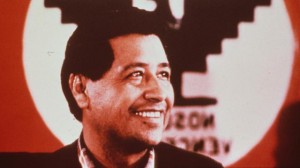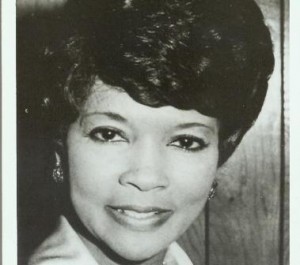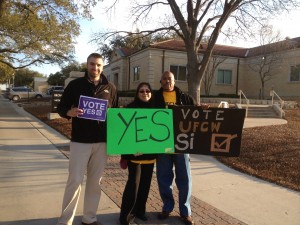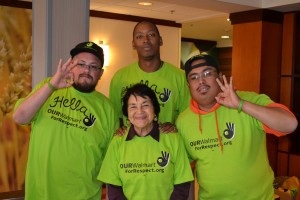March 31, 2014
UFCW Celebrates Women’s History Month and the Future of the Labor Movement
 Women’s History Month has provided us with an opportunity to highlight the lives of Mary Harris “Mother” Jones, Frances Perkins, Dolores Huerta and Addie Wyatt—remarkable women who made significant contributions to the labor movement.
Women’s History Month has provided us with an opportunity to highlight the lives of Mary Harris “Mother” Jones, Frances Perkins, Dolores Huerta and Addie Wyatt—remarkable women who made significant contributions to the labor movement.
These women’s lives have served as an inspiration to today’s female labor activists. From the brave women of OUR Walmart to the women who work in our nation’s meatpacking, food processing, and poultry plants, as well as supermarkets and retail stores, women are taking the lead in fighting for respect and dignity at work and the right to organize for better wages and benefits.
According to the Bureau of Labor Statistics, union membership remains higher for men (11.9 percent) than women (10.5 percent), but the gap is narrowing as women realize the benefits of belonging to a union. In fact, workers who were members of a union in 2013 had median weekly earnings of $950, while workers who were not union members earned $750 per week.
As UFCW members, it is our duty to welcome more women into the labor movement by spreading the word that when workers stick together as a union, they have bargaining power and a collective voice that they simply do not have when they are not unionized. In unity there is strength, and unions can lift us all up by strengthening the middle class and our economy and restoring some balance between the wealthy few and the rest of America.
March 28, 2014
Remembering the legacy of César Chávez
 Eighty seven years ago this Monday, César Chávez, a hero of the labor and civil rights movements, was born on a small ranch in Yuma, Arizona.
Eighty seven years ago this Monday, César Chávez, a hero of the labor and civil rights movements, was born on a small ranch in Yuma, Arizona.
Like thousands of others Chávez’s family lost its land in the Great Depression and headed to work in the fields of California’s central valley, where he would spend the rest of his life fighting for the rights of migrant farmworkers. Growing up, Chavez experienced grinding poverty and rampant discrimination against Mexican Americans. He left school after 8th grade and began working in the fields full time to help support his family, but he never lost his appetite for education, teaching himself about Gandhi’s non-violent strategies for social change.
Chávez’s passion for social justice led him to become a community organizer, registering Latinos to vote so they could fight for their civil rights, but he understood that farmworkers could only win dignity and respect by banding together to form a union in the fields. Even some of Chávez’s allies doubted that Spanish-speaking migrant workers could ever organize successfully, but he led the creation
of the organization that would become the United Farm Workers in 1962.
The organization struggled at first, but in 1965 Filipino workers on grape farms launched a strike demanding wages equal to the federal minimum wage (from which they were excluded) and approached Chávez for support. Chávez inspired Latino workers in the grape i
ndustry to stand in solidarity with the strike, which spread rapidly through the California fields. During the strike, Chávez pioneered unprecedented strategies that have become invaluable to all of us in the labor movement. He led workers in long marches that crossed the state of California to raise awareness of the strike, sent workers and students to cities to lead consumer boycotts
of table grapes, and even put his body on the line in a series of hunger strikes. After a grueling five year campaign, the UFW won the strike and secured living wages and a union voice in the grape fields.
After the triumph in the grape fields, the UFW grew dramatically until it represented more than 50,000 farmworkers, and farmworkers’ right to join together and bargain with their employers was e
nshrined in California law. Chávez continued to lead the UFW and fight for
the rights of workers, immigrants, and Latinos until his untimely death in 1993.
This weekend will see the release of the new movie Cesar Chavez, which document his moving story. You can find more information, including showings near you, here.
March 27, 2014
Women’s History Month: UFCW Celebrates the Life of Addie Wyatt
 Addie Loraine Cameron, better known as Addie L. Wyatt (1924 –2012), was born in Mississippi and moved to Chicago with her family in 1930. When she was 17 years old, she married Claude S. Wyatt, Jr.
Addie Loraine Cameron, better known as Addie L. Wyatt (1924 –2012), was born in Mississippi and moved to Chicago with her family in 1930. When she was 17 years old, she married Claude S. Wyatt, Jr.
She began working in the meatpacking industry in 1941. Although she applied for a job as a typist for Armour and Company, African American women were barred from holding clerical positions and she was sent to the canning department to pack stew in cans for the army. Due to a contract between Armour and the United Packinghouse Workers of America (UPWA), she earned more working on the packinghouse floor canning stew than she would have made working as a typist, and joined the UPWA after learning that the union did not discriminate against its members.
In 1953, she was elected vice president of UPWA Local 56. In 1954, she became the first woman president of the local, and was soon tapped to serve as an international representative. She held this position through the 1968 merger of UPWA and the Amalgamated Meat Cutters and Butcher Workmen until 1974, when she became director of the newly formed Women’s Affairs Department. In 1970s, she became the first female international vice president in the history of the Amalgamated Meat Cutters and Butcher Workmen and later served as director of its Human Rights and Women’s Affairs and Civil Rights Departments. She served as the first female African American international vice president of the UFCW after Amalgamated and the Retail Clerks International Union merged in 1979.
She and her husband were ordained ministers and founded the Vernon Park Church of God in Chicago. She played an integral role in the civil rights movement, and joined Dr. Martin Luther King, Jr. in major civil rights marches, including the March on Washington, the march from Selma to Montgomery, Alabama, and the demonstration in Chicago. She was one of the founders of the Coalition of Labor Union Women, the country’s only national organization for union women. She was also a founding member of the Coalition of Black Trade Unionists and the National Organization of Women.
In 1984, Addie Wyatt retired from the labor movement as one of its highest ranked and most prominent African American and female officials. In honor of her work, she was named one of Time magazine′s Women of the Year in 1975, and one of Ebony magazine′s 100 most influential black Americans from 1980 to 1984. The Coalition of Black Trade Unionists established the Addie L. Wyatt Award in 1987. She was inducted into the Department of Labor’s Hall of Honor in 2012.
March 26, 2014
UFCW President Hansen Urges Support for Discharge Petition on Comprehensive Immigration Reform
 WASHINGTON, D.C.—Joe Hansen, International President of the United Food and Commercial Workers International Union (UFCW), today released the following statement supporting the discharge petition filed by House Democrats which seeks a vote on comprehensive immigration reform.
WASHINGTON, D.C.—Joe Hansen, International President of the United Food and Commercial Workers International Union (UFCW), today released the following statement supporting the discharge petition filed by House Democrats which seeks a vote on comprehensive immigration reform.
“It has been 272 days since the Senate passed comprehensive immigration reform on a bipartisan basis. For nearly 9 months, the House has failed to follow suit. This discharge petition is a way for those who support reform to force a vote on legislation to fix our broken immigration system, protect workers’ rights, reunite families, and give aspiring Americans a path to citizenship. House Republican leaders need to stop making excuses and House Democrats who say they are with us need to make this petition a priority. Our nation deserves comprehensive immigration reform—not tomorrow, not the next day, now. The vast majority of Americans support reform—Republicans, Democrats, business, labor, faith communities, law enforcement, and students, just to name a few. The only thing stopping comprehensive immigration reform from becoming the law of the land is a small group of extremist members of Congress and their enablers. It is time to end the gridlock and hold a vote. Meanwhile, the Obama Administration should immediately stop deporting those who will achieve legal status once reform is passed.”
###
The United Food and Commercial Workers International Union (UFCW) represents more than 1.3 million workers, primarily in the retail and meatpacking, food processing and poultry industries. The UFCW protects the rights of workers and strengthens America’s middle class by fighting for health care reform, living wages, retirement security, safe working conditions and the right to unionize so that working men and women and their families can realize the American Dream. For more information about the UFCW’s effort to protect workers’ rights and strengthen America’s middle class, visit www.ufcw.org, or join our online community at www.facebook.com/UFCWinternational and www.twitter.com/ufcw.
March 26, 2014
UFCW President Hansen Urges Support for Discharge Petition on Comprehensive Immigration Reform
 WASHINGTON, D.C.—Joe Hansen, International President of the United Food and Commercial Workers International Union (UFCW), today released the following statement supporting the discharge petition filed by House Democrats which seeks a vote on comprehensive immigration reform.
WASHINGTON, D.C.—Joe Hansen, International President of the United Food and Commercial Workers International Union (UFCW), today released the following statement supporting the discharge petition filed by House Democrats which seeks a vote on comprehensive immigration reform.
“It has been 272 days since the Senate passed comprehensive immigration reform on a bipartisan basis. For nearly 9 months, the House has failed to follow suit. This discharge petition is a way for those who support reform to force a vote on legislation to fix our broken immigration system, protect workers’ rights, reunite families, and give aspiring Americans a path to citizenship. House Republican leaders need to stop making excuses and House Democrats who say they are with us need to make this petition a priority. Our nation deserves comprehensive immigration reform—not tomorrow, not the next day, now. The vast majority of Americans support reform—Republicans, Democrats, business, labor, faith communities, law enforcement, and students, just to name a few. The only thing stopping comprehensive immigration reform from becoming the law of the land is a small group of extremist members of Congress and their enablers. It is time to end the gridlock and hold a vote. Meanwhile, the Obama Administration should immediately stop deporting those who will achieve legal status once reform is passed.”
###
The United Food and Commercial Workers International Union (UFCW) represents more than 1.3 million workers, primarily in the retail and meatpacking, food processing and poultry industries. The UFCW protects the rights of workers and strengthens America’s middle class by fighting for health care reform, living wages, retirement security, safe working conditions and the right to unionize so that working men and women and their families can realize the American Dream. For more information about the UFCW’s effort to protect workers’ rights and strengthen America’s middle class, visit www.ufcw.org, or join our online community at www.facebook.com/UFCWinternational and www.twitter.com/ufcw.
March 26, 2014
UFCW Local 480 Endorses Abercrombie for Governor of Hawaii
 UFCW Local 480 has endorsed Hawaii Governor Neil Abercrombie in his bid for re-election.
UFCW Local 480 has endorsed Hawaii Governor Neil Abercrombie in his bid for re-election.
Local 480 President Pat Loo said that Governor Abercrombie has helped Hawaii turn the corner since taking office in 2010 by creating jobs and reducing unemployment.
Governor Abercrombie appreciated the support and said he looks forward to continue working with UFCW 480 to help build opportunities for the working class.
UFCW Local 480 represents 4,500 workers in Hawaii’s grocery, retail, food processing and meatpacking industries.
March 26, 2014
University Food Service Workers Vote to Join UFCW Local 1000
More than 150 Sodexo food service workers at Texas Christian University (TCU) voted to have a union voice on the job Monday night and join UFCW Local 1000. According to the workers, the vote was motivated by a change in Sodexo company policy that resulted in roughly 70 percent of TCU dining employees losing benefits such as health care coverage, vacation time, and sick leave.
Sodexo redefined full-time employment terms for workers last fall. When the change took effect, many full-time Sodexo workers at TCU became or were reclassified as part-time workers, effectively losing benefits they previously had as full-time employees.
During the campaign, Sodexo workers had support not only from UFCW Local 1000 members, but TCU students as well. Some students and student groups on campus actively voiced support for the workers’ right to join a union, including the campus chapter of the NAACP.
Negotiations for the workers are set to begin soon.
March 20, 2014
UFCW Member Faces Life after Surgery— with Disability Assistance from Union Plus
 From Union Plus
From Union Plus
For 17 years, Michael Roque of Somers Point, N.J.–a member of UFCW Local 152–did a job he was good at, caring for the elderly and bringing joy to their lives. But, after having to undergo brain surgery, the long recovery has brought big changes to his life, along with the financial strain of being unable to work full time. Now regaining his strength, Roque is thankful for the Union Plus Disability Grant1 that provided financial assistance at a critical time.
For much of his career as an activities aid in a nursing home, the symptoms from Roque’s epilepsy were kept in check. But a 2004 car accident left him experiencing three to four seizures a month. Eventually, there was no alternative but to have surgery, even though it would mean a recovery period of a year or more, while getting by on his wife Donalyd’s salary.
Assistance from Union Plus has been a huge help during such a difficult time. “I learned about the Disability Grant by chance,” Roque says. “After I got a Union Plus Credit Card, I started getting emails from Union Plus, and one of them described the Disability Grant program. With everything we were going through, it sounded like it would be great for us.”
Union Plus provides a range of unique assistance programs1 to help eligible UFCW Credit Cardholders who are facing hardship. Disability Grants of $1600 to $2700 are available to Union Plus Credit Card holders who have had the card for three months or more and who meet the eligibility requirements.
“The people at Union Plus were extremely helpful all throughout the application process,” Roque says. “They answered all my questions, stayed in touch, and we received help in less than a month.”
The last year has been a tough time in many ways, but Roque is progressing in his recovery and feeling better than he has in a long time. “I haven’t had a seizure since the surgery,” he says. “I’m getting my strength back each day.”
Roque looks forward to returning to work in the coming months. He may be unable to perform his old job, due to the stress and physical requirements, but with his years of experience and his degree in public health, he is confident of finding a good opportunity where he can put his skills to work.
“My life has changed a lot in the last year,” he says. “But I’m moving ahead now. I really appreciate the help that Union Plus provided when we needed it most.”
Do you carry a Union Plus Credit Card? They feature Disability, Job Loss, Strike, and Hospital Grants for eligible cardholders, plus, a competitive rate and all customer service calls are answered in the U.S. You can learn more by visiting www.UFCWCard.com
Also available to eligible UFCW members is the Union Plus Mortgage program, which provides a range of assistance programs, including interest-free loans and grants to help you make mortgage payments when you’re disabled, or become unemployed. Over the life of the Union Plus mortgage assistance program, more than $10.1 million in assistance has been provided to union members.
At UnionPlus.org you can learn more about these programs, as well as the Union Plus benefits and services that are available to union members and retirees. These include legal services, credit counseling, health savings programs, and the Save My Home Hotline.
# # #
1Certain restrictions, limitations, and qualifications apply to these grants. Additional information and eligibility criteria can be obtained at UnionPlus.org/Assistance.
Credit approval required. Terms & Conditions apply. Union Plus Credit Cards issued by Capital One, N.A.
March 20, 2014
Women’s History Month: UFCW Celebrates the Life of Dolores Huerta
“I think organized labor is a necessary part of democracy. Organized labor is the only way to have fair distribution of wealth.”
(Dolores Huerta)
Dolores Clara Fernandez, better known as Dolores Huerta, was born in 1930 in New Mexico, and grew up in the farming community of Stockton, California. She earned a teaching degree at Delta Community College. During that time, she met her first husband. She later married Ventura Huerta. In the early 1950s, she worked as an elementary school teacher, and many of her students were the children of farm workers who were living in poverty. Teaching the children of farm workers had a profound impact on her, and in 1955, she became one of the founders of the Stockton chapter of the Community Services Organization (CSO), which worked to improve social and economic conditions for farm workers and fight discrimination. Through her work at the CSO, she met Cesar Chavez.
In 1960, she helped create the Agricultural Worker’s Association (AWA), and in 1962, she and Chavez launched the National Farm Workers Association (NFWA), the predecessor to the United Farm Workers Union (UFW).
In 1965, she helped to organize the historic Delano Grape Strike and consumer boycott against growers of table grapes in California. The strike involved thousands of grape workers and was a significant victory for the UFW—leading to a first contract with these growers. In 1967, the NFWA combined with the AWA to create the United Farm Workers Organizing Committee. During this time, she negotiated contracts for workers, fought against the use of harmful pesticides, and advocated for unemployment and healthcare benefits for agricultural workers. In 1973, she led another successful consumer boycott against California grape growers that resulted in the California Agricultural Labor Relations Act of 1975, which allowed farm workers to form unions and bargain for better wages and working conditions.
Dolores Huerta stepped down from her position at the UFW in 1999, and established a foundation where she continues her work to improve the lives of workers, immigrants and women. She has received many honors for her activism, including the Presidential Medal of Freedom in 2012. She is portrayed by Rosario Dawson in the film “Cesar Chavez,” which screened at the White House this week.
To learn more about Dolores Huerta, follow her on Twitter (@DoloresHuerta) or visit her foundation’s website at http://doloreshuerta.org/.
March 19, 2014
UFCW Members in Minnesota Lobby in St. Paul
 UFCW members from Locals 653 and 1189 braved the snow to talk with their Representatives at the State Capitol in St. Paul, Minnesota. The members lobbied for increasing the minimum wage, paid sick leave, and medical cannabis.
UFCW members from Locals 653 and 1189 braved the snow to talk with their Representatives at the State Capitol in St. Paul, Minnesota. The members lobbied for increasing the minimum wage, paid sick leave, and medical cannabis.
Local 1189 member Dave Vasquez, who works on the kill floor at Dakota Premium, was happy to be sharing his concerns with legislators.
“This is my second time being here,” said Vasquez. “It’s important for Representatives to hear from their constituents. Workers and regular people need to be talking to them because that’s who puts them into power and feels the most impact from these laws. Coming to the Capitol helps us make our case and make some positive changes.”
Jillian Roemer, a Local 1189 member who has worked at Byerly’s in Roseville for 19 years was particularly interested in talking with legislators about the importance of paid sick leave.
“I’ve done the math and I’ve lost $240 from being sick just this year. The times I got sick were usually from someone coming to work sick and infecting me. It’s incredibly frustrating. $240 is a huge hit for me I need to pay for my mortgage, food, heat. If it’s affecting me, it’s affecting others. In the service industry, paid sick leave should be a no brainer.”
Legislators themselves were happy to see UFCW members throughout the Capitol. Representative John Marty felt that UFCW’s presence would go a long ways towards ensuring an increase in the minimum wage.
“We need working families to speak up on minimum wage and once we get that victory we have to keep going further. UFCW members being here push that train forward. Without you, it doesn’t move.”
“I thought the day was a huge success,” said Diana Tastad, a Local 1189 member who has worked at Kowalski’s for four years. “Legislators are too often out of touch with working people. They need to hear stories about not being able to feed our children. They don’t know what it’s like to go to bed hungry. The companies we work for spend money on lobbyists and are here all the time. We don’t have that money, but we have our voice, that’s our power. We can’t not show up.”


